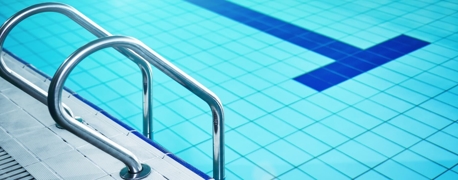Child Drownings Linked to Adult Smartphone Use

Each year, an average of 4,000 people in the U.S. die from drowning, with more than 900 of these deadly drownings consisting of children or teenagers. In fact, the Centers for Disease Control and Prevention warns that drowning is the number one cause of death for children between the ages of one and four.
What's even worse is how tragically preventable these child drownings are. If you research the matter further, one article that most other articles will link out to is a piece by The Guardian that recounts how the German Lifeguard Association (DLRG) reviewed the 300 child drownings that had occurred in 2017 alone. The DLRG said this spike in drownings was connected to cell phone usage, saying that some parents were not looking up from their screens often enough to watch swimming children.
"Too few parents and grandparents are heeding the advice: when your children and grandchildren are in the water, put your smartphone away," DLRG spokesman Achim Wiese said.
Why Cell Phone Use Is Dangerous Near Pools
Many adults assume that if a child is in trouble, they'll be able to hear when things go wrong, the thrashing in the water and yelling. However, when a child starts drowning, they're already underwater, trying to push the water down so they can get their head above the surface again. By then it's too late for them to call out for help or to make other noise, even with their hands.
According to experts, it can take just 20 to 25 seconds for a young child to drown, and most drownings are silent.
It's unrealistic to assume that anyone can consistently pull their eyes away from a social media feed every 20 seconds in order to ensure a swimming child's safety. It's simply not safe to get distracted by any device or task at all, even for half a minute.
Underlining this point is an Australian study, which stated that what child drowning accidents most often had in common was the failure of an adult to focus on supervising, with phones being one of the culprits that took away parental attention. Of the parents and parental figures in the study who were on their phones, not a single one of them could provide adequate supervision for a swimming child. In many instances, these caregivers failed to recognize to what extent their attention was lapsing. They mistakenly believed that they were capable of multi-tasking.
Other Supervising Mistakes & Cell Phone Use
Proximity to swimmers is a key factor in being able to ensure the safety of young kids in the water; while noticing a drowning child is one thing, being close to help them out is another. Since older model smartphones must be kept away from water, adults may distance themselves from a swimming pool or hot tub while monitoring children. In doing so, they think to keep their phone safe as they use it, supposing that they can still keep a close enough and watchful enough eye on their kids.
Drownings also happen even when there is a group of people around a swimming pool. Whoever is tasked with supervising young swimmers must be clearly assigned with that task, as tragic miscommunication has contributed to a lack of supervision, e.g. one parent handles a different task or answers a phone call when they shouldn't, thinking the other parent was watching when they weren't. This need for constant supervision even applies at swimming pools where there are lifeguards, per the CDC. If there are multiple children in the water, then you are still the main lookout for your child's safety, as you may be able to notice your child struggling a good several seconds before the busy lifeguard does, and every second counts.
It can't be emphasized enough how little room there is for distraction. Whoever is watching out for the young swimmers should not be handling anything else, not talking on the phone, not drinking alcohol, not even scrolling through social media, checking a game score and highlights, or texting.
What If My Child Has Had Swimming Lessons?
While it is important and recommended to have kids learn water safety and swimming skills, it shouldn't allow parents to let down their guard. Adults who had their child take swimming lessons have been found to be overly confident that their child can handle themselves just fine in the water, and they therefore think their child needs only minimal supervision. This mistaken belief could cost children precious seconds where their parent is inattentive. Even if a child is a decent swimmer, if they get into trouble at any point, it will likely be too late for them to get anyone's attention as they will already be submerged underwater.
It doesn't matter how strong a child's swimming skills are; constant supervision is always necessary.
Close Supervision Is One of the Best Methods of Drowning Prevention
Yes, knowing CPR is important for saving kids from drowning, but you can only apply CPR if you get to the kid in time. Fences and other safety measures are crucial for ensuring that a young child doesn't wander near the water and slip in while their guardian is unaware, but once you let a child in through that gate and into the water, it's an adult's responsibility to ensure their child is safe while in the pool.
Many drowning accidents are preventable, and every second of vigilance counts when it comes to preventing tragedy. Cell phone use can quickly distract, and no one can truly multi-task while engaging with their smartphone. While having a phone on hand is helpful if there's an emergency, it's important to not pick up the phone unless and until there is in fact an emergency.
- Categories


